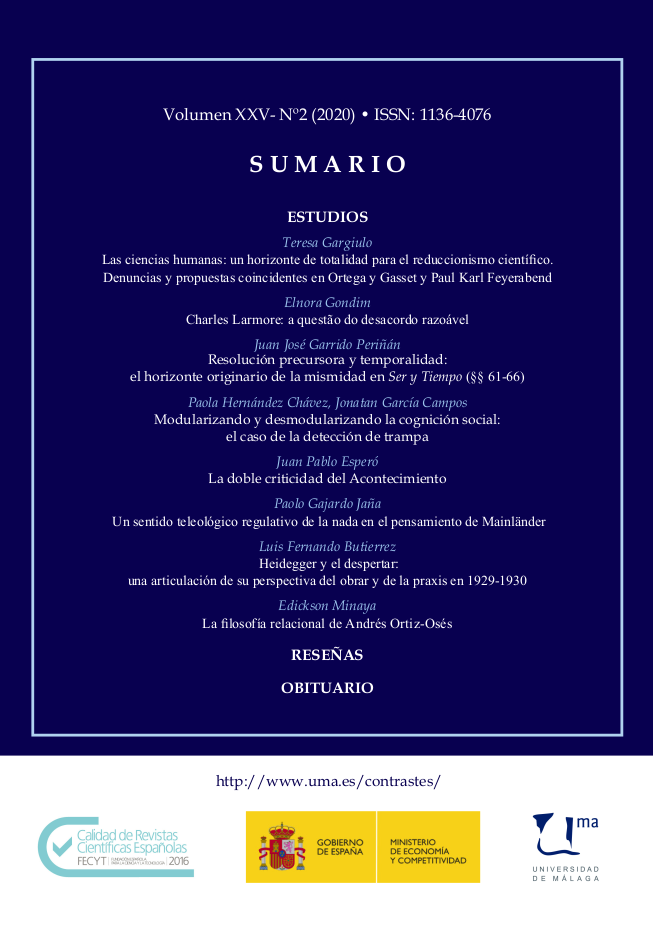Human Sciences: A Horizon of Totality for Scientific Reductionism. Complaints and Pro-posals matching in Ortega y Gasset and Paul Karl Feyerabend
DOI:
https://doi.org/10.24310/Contrastescontrastes.v25i2.6857Keywords:
ORTEGA Y GASSET, REDUCTIONISM, HUMAN SCIENCES, PERSPECTIVISM, FEYERABENDAbstract
The experimental designs adopted in the empirical sciences translate and select phenomenal externalizations, so that they constitute certain forms of perception and verification possibilities that come from the «object » itself. On a meta-theoretical level, we could identify in such designs reductionisms that facilitate all kinds of epistemic and methodological simplifications at the expense of eliminating things that need to be understood and that are part of a complete picture of the phenomenon we study. By reductionism, we understand the process of simplification and operability that an experimental design demands. Well, both Ortega y Gasset and Paul Karl Feyerabend denounce the consequences and absurdities that follow the various forms of reductions for the same science. It is not new at all to recognize in Ortega y Gasset a true philosopher of science, much less find affinities with the great representatives of this disciplinary field. In this work we will analyze how the Orteguian readings of this problem, as well as its proposal, run in parallel to Feyerabend’s complaintsDownloads
Metrics
Publication Facts
Reviewer profiles N/A
Author statements
Indexed in
-
—
- Academic society
- N/A
- Publisher
- Universidad de Málaga
References
AGAZZI, Evandro.1978: Temas y problemas de Filosofía de la Física. Barcelona: Herder.
BUENO, Gustavo. 2001: «La idea de ciencia en Ortega», El Basilisco, 31, pp.15-30.
FEYERABEND, Paul. 1958: «Complementarity». Proceedings of Aristotelian Soci-ety, Suppl. Vol. 32, pp. 75-104.
___. 1960/1981: «On the Interpretation of scientific theories». Realism, rationalism and scientific method, Philosophical Papers Volume 1. Cambridge, Cam-bridge University Press, pp. 37-43.
___. 1961/1999: «Knowledge without foundation». Paul K. Feyerabend: Knowledge, Science and Relativism, Philosophical Papers Volume 3,John Preston (ed.). Cambridge, Cambridge University Press, pp. 50-77.
___. 1962/1981: «Hidden variables and the argument of Einstein, Podolsky and Ros-en». Realism, rationalism and scientific method, Philosophical Papers Vol-ume 1. Cambridge, Cambridge University Press, pp. 298-342.
___. 1962/1989: Límites de la ciencia. Explicación, reducción y empirismo. Barce-lona, Paidós.___. 1965/1981: «Reply to Criticism. Comments on Smart, Sellars and Putnam». En Realism, rationalism and scientific method, Philosophical Papers Volume 1. Cambridge, Cambridge University Press, pp. 104-131.
___. 1967: «The Mind-Body Problem».Continuum 5, pp. 35-49.
___. 1970/1981: «Consolations for the Specialist». Problems of Empiricism. Philo-sophical Papers Volume 2. Cambridge, Cambridge University Press, pp. 131-167.
___. 1970/1989: Contra el método. Esquema de una teoría anarquista del conoci-miento.Barcelona: Ariel. ___. 1972/1999: «On the Limited Validity of Methodological Rules». EnKnowledge, Science and Relativism. Philosophical Papers. Volume 3. By Paul Karl Feyerabend.John Preston (ed.). Cambridge: Cambridge University Press, pp. 138-180.
___. 1975/1992: Tratado contra el método: esquema de una teoría anarquista del conocimiento. Diego Ribes (trad.).Madrid: Tecnos.
___. 1978/1982: La ciencia en una sociedad libre. Alberto Elena (trad.). Madrid:Siglo XXI,
___. 1987/2005: Adiós a la razón. José R. de Rivera (trad.). Madrid: Técnos.
___. 1989/2000: Diálogos sobre el método. 2ª ed. Madrid: Cátedra.
___. 1991: Diálogos sobre el conocimiento. Jeronima Garcia Bonafe (trad.). Madrid: Cátedra.
___. 1991/2003: Provocaciones filosóficas. Ana P. Esteve Fernández (trad.). Madrid: Biblioteca Nueva.
___. 1993/2008: Against Method.London: Verso.
___. 1994/2000: La conquista de la abundancia: la abstracción frente a la riqueza del ser. Radamés Molina y César Mora (trads.), Barcelona: Paidós.
___. 1996/1999. Ambigüedad y Armonía. Barcelona: Paidós.
GARCÍA ASTRADA, Arturo. 1959: «Teoría de la ciencia en Ortega», Revista de la Facultad deFilosofía y Letras, 12, pp. 57-78.
GARRIDO, Manuel. 1983: «El yo y la circunstancia», Teorema, XIII, 3:4, pp. 309-343.MIQUEL, Mercedes. 1992: «Filosofía de la Ciencia en Ortega y Gasset Ciencias Naturales y Humanas: hacia una demarcación», Logos. Anales del Seminario de Metafísica. Núm. Extra. Homenaje a 5. Ráhade. Ed. Complutense, pp. 127-154.
MARTÍNEZ BONATI, Félix. 2000: «El postmodernismo de Ortega y Gasset», Mester, 29, pp. 1-27.
ORTEGA Y GASSET, José. 2004-2010: Obras Completas. Tomos I-X. Madrid: Taurus.
PELLICANI, Luciano. 2007: «Ortega y Popper: trayectorias paralelas», Revista de Occidente, 312, pp. 35-56.
RUIZ FERNÁNDEZ, Jesús. 2013: «Ortega y Gasset, filósofo de la ciencia»,ÉNDOXA: Series Filosóficas, 31, pp. 109-126.
Downloads
Published
How to Cite
Issue
Section
License
This journal provides immediate free access to its content under the principle of making research freely available to the public. All content published in Contrastes. Revista Internacional de Filosofía, are subject to the Creative Commons Attribution-NonCommercial-ShareAlike 4.0 license whose full text can be found at <http://creativecommons.org/licenses/by-nc-sa/4.0>
It is the responsibility of the authors to obtain the necessary permissions of the images that are subject to copyright.
Authors whose contributions are accepted for publication in this journal will retain the non-exclusive right to use their contributions for academic, research and educational purposes, including self-archiving or repository in open access repositories of any kind.
The electronic edition of this magazine is edited by the Editorial Service of the University of Malaga (Uma Editorial), being necessary to cite the origin in any partial or total reproduction.










5.png)
